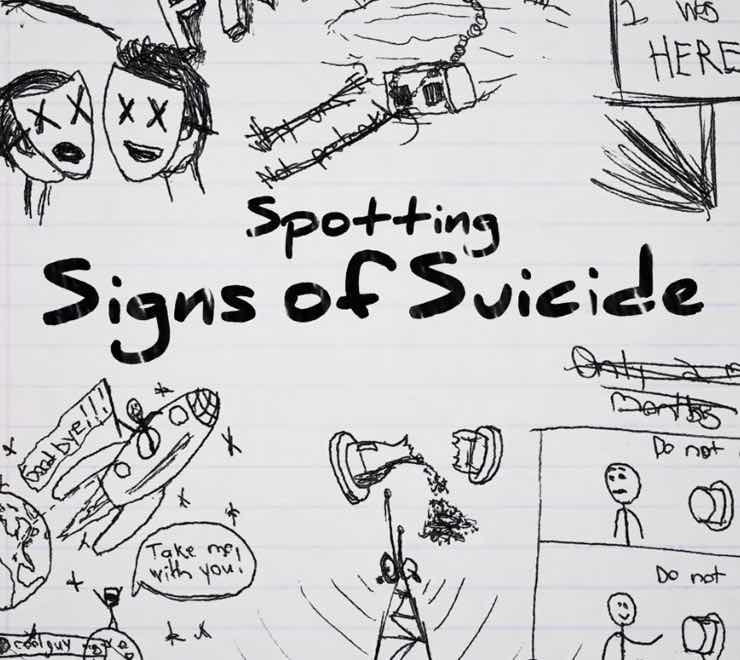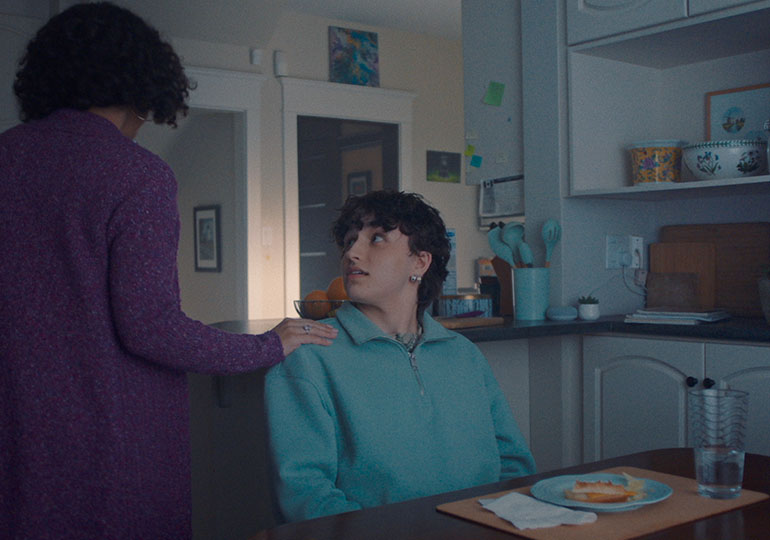Everyone plays an important role in preventing suicide. If you think someone in your life may be experiencing suicidal thoughts, there are things you can do to support them. It’s also important to recognize your limits and care for your own well-being. Here, Kids Help Phone shares information about warning signs, tips for helping a friend and ways you can care for yourself.
How can I tell if someone is having thoughts of suicide?
Thoughts of suicide can be expressed in many different ways and are unique to each person’s experience. While the majority of people who die by suicide show warning signs ahead of time, many people don’t recognize them because of stigma, misinformation and a lack of education around suicide.
Some warning signs of suicide include:
A drastic change in mood or behaviour
A sudden change in someone’s mood or behaviour may be an indicator that something isn’t right. This can present in a number of ways:
- telling jokes about taking their own life
- changing their usual routine significantly
- acting withdrawn or making excuses about why they can’t hang out
- taking more risks
- isolating from other people
- giving away possessions
- engaging in substance use (more or different from their usual habits)
You may also notice that they seem unusually or especially irritated, angry, desperate, annoyed or don’t seem to care about anything. If a friend or someone you know is behaving in a way that concerns or worries you, there are things you can do to support them.
Thoughts and feelings expressing helplessness or hopelessness
A person having thoughts of suicide may genuinely believe that death or dying is the only way to solve difficulties or challenges they’re facing. It’s important to remember that someone who talks about ending their life doesn’t necessarily want to die, but wants to express that they’re struggling with intense pain. Talking about suicide may be one way someone is reaching out for help. You may recognize these thoughts and feelings in phrases like:
- “No one cares.”
- “I can’t take it anymore.”
- “The world would be better off without me.”
- “It’s not worth it.”
- “I’ll be gone soon.”
- “I’m a burden.”
- “If I died then I wouldn’t have to deal with this.”
- “I wish I were dead.”
- “I wish I hadn’t been born.”
- “Dying is the only thing that will help.”
- “Things will never get better.”
- “I can’t do anything.”
- “I have no future.”
- “I can’t take anymore.”
- “I just want it all to go away.”
Thoughts of suicide look and feel different for everyone
One of these signs alone (a change in mood or behavior, expressions of hopelessness or helplessness, thoughts that death is the only way to fix something) doesn’t automatically mean that a person will have thoughts of suicide. It’s also possible for someone to experience thoughts of suicide and not have any of these signs. As a supporter and friend, learning about these signs and phrases of concern can help alert you that someone in your life might need additional support.
You can learn more about the reasons why a person might develop thoughts of suicide here. For more information about spotting warning signs of suicide, check out the video below:
If you or someone you know is experiencing feelings of hopelessness and/or suicidal thoughts, it’s important to remember that help is available. You can reach out to Kids Help Phone’s professional counsellors and volunteer crisis responders for 24/7 mental health support.
How can I support someone I’m worried about?
It can be difficult to know how to approach someone about suicide. The person you’re worried about may feel embarrassed or confused and not want you to tell anyone else. It’s also possible they’ve reached out to someone before and had a bad experience. There are many factors that make it difficult to reach out for support. Here are steps you can take to support people in your life:
Show that you care
Reach out to the person you’re worried about. Share that you care about their safety and let them know you’re someone they can reach out to for support. You can open up a conversation in a neutral way with these phrases:
- “You seem really down lately. Do you want to talk about it?”
- “I’m worried about you. Can we talk about what’s going on?”
- “I know it can be hard to talk about your feelings, but if you want to, I’m here for you.”
Focus on the whole person and not just their struggles by reminding them of their strengths and positive qualities. Making space for your friend can help to acknowledge their pain, sort out their thoughts, gain perspective and help them feel less alone. You don’t have to solve their problems –– just listening without judgment can go a long way.
Ask directly
It’s OK to ask someone directly if they’re thinking about suicide. Asking about suicide openly and directly lets people know you’re someone who notices things and cares and reduces stigma and shame. Many people who have thoughts of suicide struggle for a long time before opening up and may feel a sense of relief when asked. You can ask directly by saying:
- “Are you thinking about suicide?”
- “Are you having thoughts of death or dying?”
- “Have you been thinking about killing yourself?”
When asking, you can also refer to the warning signs listed above to make it clear why you’re bringing it up. For example, you might say, “Sometimes when people are joking about death, they’re thinking about suicide. Are you having thoughts of suicide?” or “I’ve noticed you’ve been more withdrawn lately. Are you having thoughts of death or dying?”
Suicide is very serious and not something that you should keep secret. If your friend admits to having thoughts of suicide, it’s important for them to get support. Offer to go with them to speak to a safe adult or stay with them while they reach out to Kids Help Phone. Our professional counsellors and volunteer crisis responders are available 24/7 to provide support.
If you think your friend is in immediate danger, call 911, emergency services or mobile crisis support (if available in your area). It’s an emergency if you’re worried that the person may do something to hurt themselves and can’t make a plan for their safety. It’s important to involve medical and/or mental health professionals to make sure they get the help they need.
Get support
Supporting someone with thoughts of suicide can be difficult, but you don’t have to be alone in the process. As a supporter, it’s important to take care of yourself too, like connecting with your community or practising self-care. If you want someone to talk to, you can connect with a counsellor, friend, teacher, parent/caregiver, Elder or reach out to Kids Help Phone for support.
Losing someone to suicide can be devastating. If someone you know does die by suicide, know that it’s not your fault they died. While it’s natural to experience guilt and confusion, you’re not responsible for another person’s actions. It’s important to treat yourself with compassion and be kind to yourself as you heal.
Supporting a friend with thoughts of suicide can be tough. Remember the warnings signs and care for yourself and your well-being too. You can be proud of yourself for taking the time to learn what to do and support your friend with whatever they may be going through.













